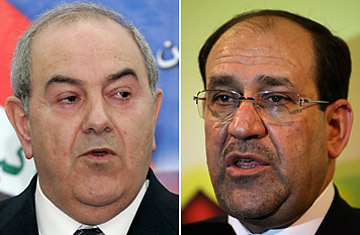
From left: Former Iraqi Prime Minister Iyad Allawi and current PM Nouri al-Maliki
As the storm clouds gather for Iraq's postelection season of political turmoil, the prospects for stable governance as U.S. combat troops prepare to depart appear increasingly uncertain. Preliminary returns released Thursday from four of Iraq's 18 provinces show the incumbent, Prime Minister Nouri al-Maliki, carrying predominantly Shi'ite areas — despite a strong challenge from supporters of radical cleric Muqtada al-Sadr. Former U.S.-installed Prime Minister Iyad Allawi, a secular Shi'ite who, like Maliki, leads a broad nationalist coalition with strong Sunni Arab representation, appears to have prevailed in predominantly Sunni areas north of Baghdad.
If that pattern holds, Maliki's State of Law coalition would likely emerge with a plurality of the vote; there are, after all, probably twice as many Shi'ites as there are Sunnis in Iraq's electorate, even though hundreds of thousands more Sunnis appear to have voted this time compared with 2005's turnout. But Maliki is unlikely to win a majority, and would need coalition partners — perhaps from among the Kurdish nationalist parties that again polled strongly enough in their own areas to potentially earn a kingmaking role in Baghdad, or from the Sadrists and other Shi'ite Islamist parties, or even from Allawi's bloc. But Allawi has alleged widespread fraud by his opponent's supporters, setting the stage for a potentially violent struggle over the election's legitimacy. For many Sunnis who voted for the first time on Sunday, being told that the election was rigged against them would reinforce their alienation from the post-Saddam political order — and raise the potential for violence.
Even if the results are accepted, the current pattern suggests bad news for Maliki. It has been widely suggested that most of the potential coalition partners to whom his bloc would turn would insist that Maliki himself step down and accept an alternative candidate for Prime Minister. A frenzy of negotiations among leaders from all the political blocs is already under way, but it could take weeks — even months — to yield a new government. Accusations of ballot fraud could undermine the legitimacy of any new government and also weaken Maliki, who will remain in charge until one is formed.
Although Maliki's and Allawi's blocs both articulate a message of Iraqi national unity over ethnic or sectarian loyalties, the political contest is still fueled by the unresolved struggle over power and resources between rival communities. That contest echoes a regional power struggle, with Iraq's predominantly Sunni neighbors such as Saudi Arabia, Jordan and Syria supporting a greater share of power for Iraq's Sunnis. Allawi's list of candidates includes some of the key Sunni political players, and the self-styled strongman makes no secret of his desire to challenge Iranian influence in Baghdad. Iran would prefer that Maliki stay in power, though Tehran is even closer to his Shi'ite rivals such as Sadr and the Islamic Supreme Council of Iraq.
The stakes in Iraq's political process — domestically and regionally — are high, and reflect the absence of a consensus on both fronts. Despite their distaste for Saddam Hussein, Iraq's Arab neighbors had long looked to his regime to serve as a regional bulwark against Iranian influence in the Middle East, and supported his eight-year war against the Islamic Republic in the 1980s. The U.S. invasion removed that bulwark, and Iran has profited greatly from Iraqi democracy. The governments elected since Saddam's overthrow have been uniformly friendly toward Tehran and dominated by Shi'ite parties. While none of these governments have been a proxy for Iran, they have certainly been resistant to being drawn into anti-Iran regional power games.
In light of the ongoing power struggle between Iraq's communities and their regional supporters, the design of the country's democratic system may hamper efforts to build a strong government. Iraq's democracy is a parliamentary system based on the principle of proportional representation — voters all over the country simply choose a party or bloc, whose list of candidates is then allocated the number of seats in parliament proportional to its share of the total vote. The Prime Minister is chosen by a parliamentary majority. While the system may be designed to promote consensus, in the absence of consensus it can be a recipe for weak and unstable government. (Ironically, Israeli leaders can sympathize: their own proportional-representation system gives massively disproportionate influence to smaller parties, who claim control over ministries and their power of patronage as the price for their parliamentary votes in a ruling coalition.)
Rather than clarifying Iraq's political future as American combat forces plan to withdraw in the summer, the election appears to have yielded another period of political uncertainty. Until now, Iraqi politicians have managed to hold things together by deferring decisions on some of the toughest points of contention, such as the status of Kirkuk — the oil-rich northern city coveted by the autonomous Kurdish region, a claim fiercely resisted by the Arab majority, first and foremost the Sunnis who live in the area — and the mechanisms for sharing the country's oil wealth. Cobbling together a new ruling coalition is unlikely to see any decisive resolution of those deep-seated conflicts. They could well remain unresolved as the U.S. forces begin to go home. Worse still, if disputes over the election are taken to the streets, the security situation could plummet precipitously.
